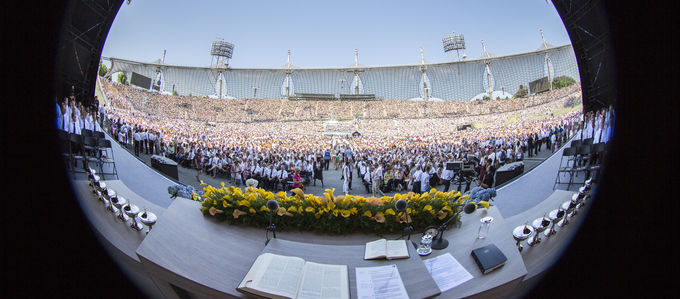Pentecost: a festival of fellowship and understanding
We have started into an exciting week. This coming weekend we will be celebrating the highlight of our Church year. What happened at Pentecost? What significance does the feast have for us as Christians? A reflection in two parts.

According to the traditional Jewish calendar, Pentecost was the festival of Shavuot (meaning “weeks”), a Jewish festival of joy and thanksgiving. In Greek it was called pentekostē hēméra, meaning the 50th day. According to the Mosaic Law, Shavuot (Festival of Weeks) was to be celebrated seven full weeks plus a day after Passover (Leviticus 23: 15–16), in other words, fifty days after Easter.
Added significance for an established festival
The people at the time of Jesus were not only familiar with the festival’s meaning, but it was well established in the yearly cycle of events and very important at that. It was one of three festivals at which every male Israelite was expected to appear before the Lord (Exodus 23: 14–17). The offerings that were to be brought were two loaves of bread, made from the first corn that was harvested.
With the outpouring of the Holy Spirit, Pentecost was given added significance: the Comforter and Helper came to the believers. The Son of God had already prophesied this, “And I will pray the Father, and He will give you another Helper, that He may abide with you forever—the Spirit of truth, whom the world cannot receive, because it neither sees Him nor knows Him; but you know Him, for He dwells with you and will be in you” (John 14: 16–17).
“That He may abide with you forever”
He will abide with you forever, Jesus had told His disciples. What a difference to the people’s earlier conception. The Holy Spirit would dwell with them forever. He …
- … is the Comforter and Helper, who will make sure that the teachings of Jesus, His gospel, would be kept alive (John 14: 26).
- ... testifies of Christ (John 15: 26).
- ... is the Spirit of truth, who will lead deeper and deeper into the truth and reveal causal relationships which Christ had not yet disclosed to His disciples (John 16: 12–14).
A rushing mighty wind from heaven
What happened on the day of Pentecost—the tenth day after Christ’s ascension and the fiftieth day after His resurrection—is described in a very vivid way in the second chapter of Acts: “When the Day of Pentecost had fully come, they were all with one accord in one place. And suddenly there came a sound from heaven, as of a rushing mighty wind, and it filled the whole house where they were sitting. Then there appeared to them divided tongues, as of fire, and one sat upon each of them. And they were all filled with the Holy Spirit and began to speak with other tongues, as the Spirit gave them utterance” (Acts 2: 1–4).
Many heard this sound from heaven and were curious so that a large crowd gathered: Jews, passers-by, tourists, and people who had come for the festival. There were people from every nation under heaven. They were bewildered and amazed at what they heard, because everyone heard the disciples of Jesus, men from Galilee, speak in their own language.
A miracle of hearing and comprehension
From the perspective of salvation history, the Pentecost miracle is often seen as a counter-image to the confusion of tongues at the tower of Babel. At the time, God had decided to confound the people’s speech. Until then the people had all spoken one and the same language. When they could no longer understand each other, they scattered all over the earth. And now, at Pentecost, many people from many countries and speaking various languages had gathered and were able to understand what the Spirit of God had to tell them.
Pentecost is therefore clear proof that the gospel of Jesus Christ is destined for all people of all languages and can be grasped and believed by everyone, irrespective of ethnicity, education, or culture. In this respect Pentecost is also a festival that promotes comprehension.
But the significance of Pentecost goes far beyond the actual miracle. More on this in the second part of our article tomorrow on nac.today.
Photo: Jessica Krämer




